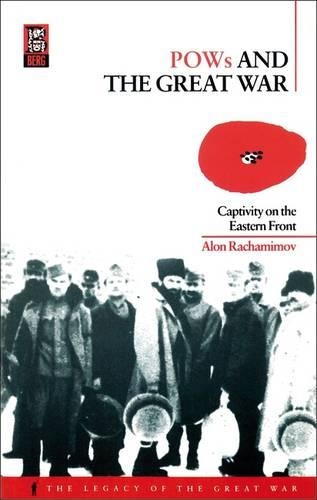
POWs and the Great War: Captivity on the Eastern Front
(Paperback)
Publishing Details
POWs and the Great War: Captivity on the Eastern Front
By (Author) Professor Alon Rachamimov
Bloomsbury Publishing PLC
Berg Publishers
1st September 2010
United Kingdom
Classifications
General
Non Fiction
European history
First World War
940.472
Physical Properties
Paperback
272
Width 138mm, Height 216mm, Spine 13mm
Description
Joint Winner of Fraenkel Prize for Contemporary History 2001, London. Winner of Talmon Prize, Israel, awarded by the Israeli Academy of Sciences. Although it was one of the most common experiences of combatants in World War I, captivity has received only a marginal place in the collective memory of the Great War and has seemed unimportant compared with the experiences of soldiers on the Western Front. Yet this book, focusing on POWs on the Eastern Front, reveals a different picture of the War and the human misery it produced. During four years of fighting, approximately 8.5 million soldiers were taken captive, of whom nearly 2.8 million were Austro-Hungarians. This book is the first to consider in-depth the experiences of these prisoners during their period of incarceration. How were POWs treated in Russia What was the relationship between prisoners and their home state How were concepts of patriotism and loyalty employed and understood Drawing extensively on original letters and diaries, Rachamimov answers these and other searching questions. In the process, major omissions in previous historiography are addressed. Anyone wishing to have a rounded history of the Great War will find this book fills a major gap.
Reviews
'Based on several years of research in Austrian, German, and Russian archives, this book brilliantly analyzes the problems, suffering and occasional joys of millions of Germans, Austrians, Hungarians, Czechs, Poles, and other nationalities whom World War I thrust as prisoners of war into Siberia. Alon Rachamimov shows, contrary to earlier historians, that the ethnic hatreds that characterized East Central Europe in the interwar period did not originate from the POW camps; rather, the prisoners got along better wiih one another than the tsarist authoritites would have liked.' Istvan Deak, Columbia University 'Covers new ground and has very suggestive things to say about the way prisoners of war become forgotton people in the narratives constructed after the war by soldiers themeselves. It is also valuable in adding to the as yet thin literature on the war on the Eastern Front, and to an understanding of the cultural life of prisoners' Jay Winter, Columbia University 'This deep and poignant book ... brings together two forgotten aspects of the Great War, the Eastern front and the prisoners of war. It brings back these so called 'peripheric' or marginal topics to the center of the war culture and helps our understanding how their oblivion during the twenties and thirties was part of an abrasion of the most awful realities of First World War.' Annette Becker, University Paris-X/Nanterre, author of Oublies de la Grande Guerre, populations occupees, deportes civils, prisonniers de guerre, Noesis, 1998 'Rachmamimov not only presents the details of the POW experience. He also analyzes the effects of prolonged captivity on individual identity, and on attitudes towards the state that in a sense failed the soldier by allowing his captivity. POWs and the Great War is a major historical and intellectual contribution to the study of military captivity in the 20th century.' Dennis Showalter, Colorado College and Past President of the Society for Military History 'The history of captivity on the Eastern Front remains largely unwritten. In his book POWs and the Great War, Alon Rachamimov addresses this gap in the histiography of the First World War. In the process he undermines a large number of myths regarding the war and its consequences ... Rachamimov puts forward a well-researched and well-argued case ... There is little to criticize in this original and interesting work.' SEER 'The study is based on previously unused or unreleased material in the Austrian and Russian state archives, supported by a thorough knowledge or relevant secondary literature in well over half a dozen languages ... This is an extraordinarily rich book, with a vast amount packed into a comparatively slim volume ... The fact that Rachamimov has interesting points to make on a range of issues is testimony both to his historical skill and to his willingness to challenge received ideas ... this is an extremely important, thought-provoking work, and it is little wonder that it sports a couple of 'medals' of its own, having been the joint winner in 2001 of the Fraenkel Prize for Contemporary History, and winner of the Talmon prize awarded by the Israeli Academy of Sciences.' European History Quarterly 'This is a powerful and persuasive book; it displays an intimate knowledge of the operation of East End society, the characteristics of the crowd in the unemployment disturbances in the West End of London in 1886, and many other factors.' Keith Laybourn, History: The Journal of the Historical Association
Author Bio
Alon Rachamimov Lecturer in Modern European History,Tel Aviv University, Israel.
